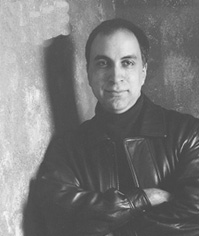
Composer Anthony Cornicello (born in Brooklyn, New York, 1964) writes music that blurs distinctions between performers and electronics, timbre and harmony, composition and improvisation, and explores the boundaries of what may be considered post-classical concert music. His music is vibrant and visceral, full of rhythmic energy and harmonic sophistication, and his forays into live electronics have led to exciting combinations of instruments and processed sound. Cornicello’s background as a jazz pianist is evident not only in the rhythmic activity of his music, but also in his constant investigation of the rich sonorities available from a variety of instruments.
He has been commissioned to write music for the Scorchio Electric String Quartet, ModernWorks! (funding from Meet the Composer/ Commissioning Music USA), the Auros Group for New Music, the Prism Saxophone Quartet, the New York New Music Ensemble, David Holzman, the Group for Contemporary Music, and the InterEnsemble of Padova, Italy. His work has also been featured on the Guggenheim Museum’s “Works and Process” series. Cornicello’s works have also been performed by the Chicago Civic Symphony, Parnassus, ALEA III, Composers Concordance, Madeleine Shapiro, Robert Black, among many other outstanding groups and solo performers. His music has been presented as part of the Darmstadt International Festival of New Music as well as the June in Buffalo Festival.
Cornicello’s Second String Quartet has been recorded by the Atlantic String Quartet; the Second Sonata for Piano by David Holzman (Centaur). More recently, his Post-Modern Waltz was recorded by Eric Moe for Albany Records. A portrait CD of Cornicello’s works is scheduled for 2006 release on Albany Records.
As a performer, he has conducted or played piano in his own works on numerous occasions. While a graduate student at Rutgers, he formed and directed the Janus Ensemble, a group dedicated to contemporary music. More recently, Cornicello has begun performing on the laptop, using a variety of interfaces and the Max/MSP program. Those performances, mostly with EEE!, have had a notable impact on his music, as EEE!’s music ranges from hip-hop to experimental noise. EEE! is based at Eastern Connecticut State University, where Cornicello is an Associate Professor and Director of the Electronic Music Lab.
Cornicello received the Ph.D. from Brandeis University, where he studied with David Rakowski, Eric Chasalow, and Martin Boykan. His teachers also include Charles Wuorinen, Gérard Grisey, and Richard Beirach.
His current fields of interest include developing unusual interfaces for live computer music performances, as well as continuing to investigate resonance and spatialization. His recent and current projects (mostly for string instruments and electronics) have been exploring the latter two, and the series of experimental works ReZenant Garden, performed by EEE! have operated on all three areas of interest. Future projects will include works for instrumental groups or soloists and electronics, as well as turntablists.
Cornicello's works are published by C.F. Peters Corporation and APNM, and he is a member of BMI.
|
|
|
|
|
|

Monday, August 20, 2007
Now this is censorship
There are pages on the web that claim to demonstrate censorship. The usual story is a band wants to play on a show (let's say something like SNL or Letterman), and they are asked to cut an objectionable song. They do the performance, looking rather unhappy, without the offending song. Sometimes, the band refuses to cut the song, and they don't perform at all, or their performance winds up on the editing room floor. The band and the fans claim censorship, but it's really a case of capitalism. The broadcaster and/or sponsors aren't thinking artistically, their thinking sales.
Furthermore, most of these 'censored' items aren't political in nature. Usually, there's some profanity or overt sexual reference. The broadcaster has to weigh the options of freedom of speech vs. the possible ensuing controversy. More often, they're more concerned with their own self image rather than artistic freedom, and the offending material gets cut. It's not a happy situation, but it's business.
Then, I see this. Now, I'm not a huge fan of Pearl Jam, but this upsets me. AT&T took it upon themselves to censor a line out of one of their songs. And this one was political, criticizing the President. Mind you, it was kind of mild - far worse things have been said about him. AT&T got to broadcast Pearl Jam, who thought their entire concert was going out on the web; two slightly offensive lines were surreptitiously removed from the song. (I don't know - are their many right wing supporters of Pearl Jam? Are they part of that 28% who thinks W is marginally competent?)
Besides the issue of censorship, this relates to the whole idea of net neutrality. What's next, limiting access to Kyle Gann's blog page? Or Frank Rich's (he must have one...)
I'm hoping this story has legs. Please, if you're reading this, pass it on. And, if you're someone like Kyle or Frank, please wrtie about it.
posted by Anthony Cornicello
|
| |



